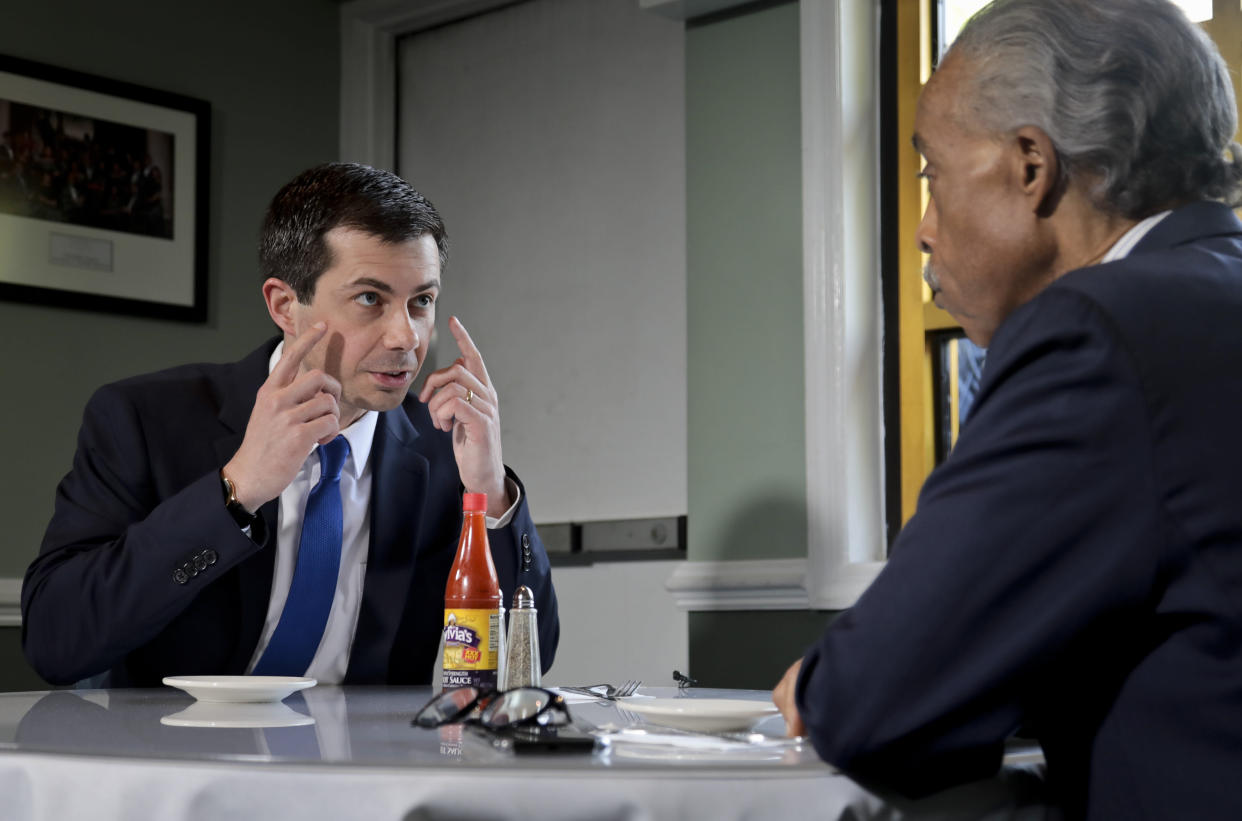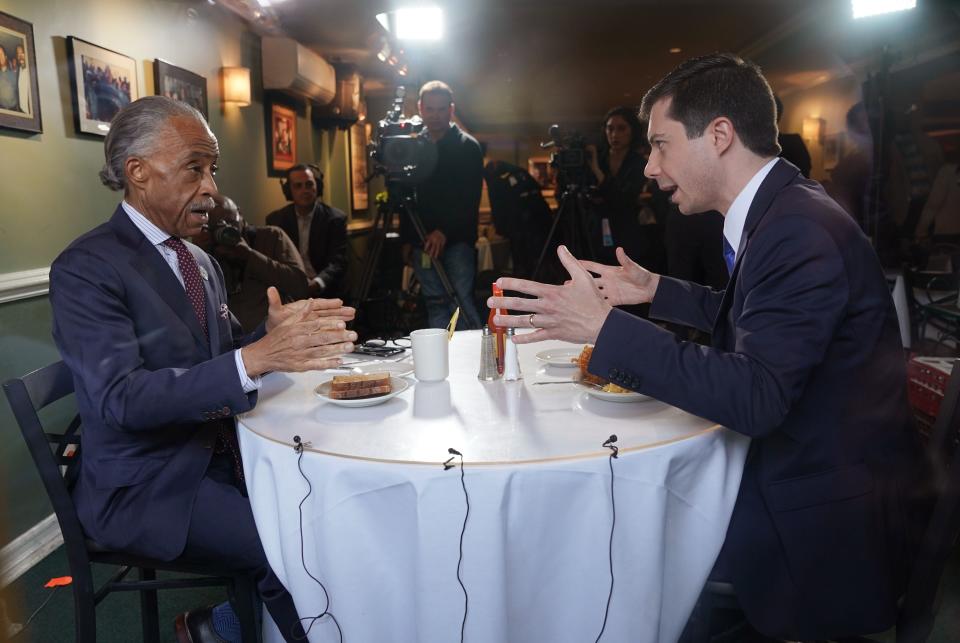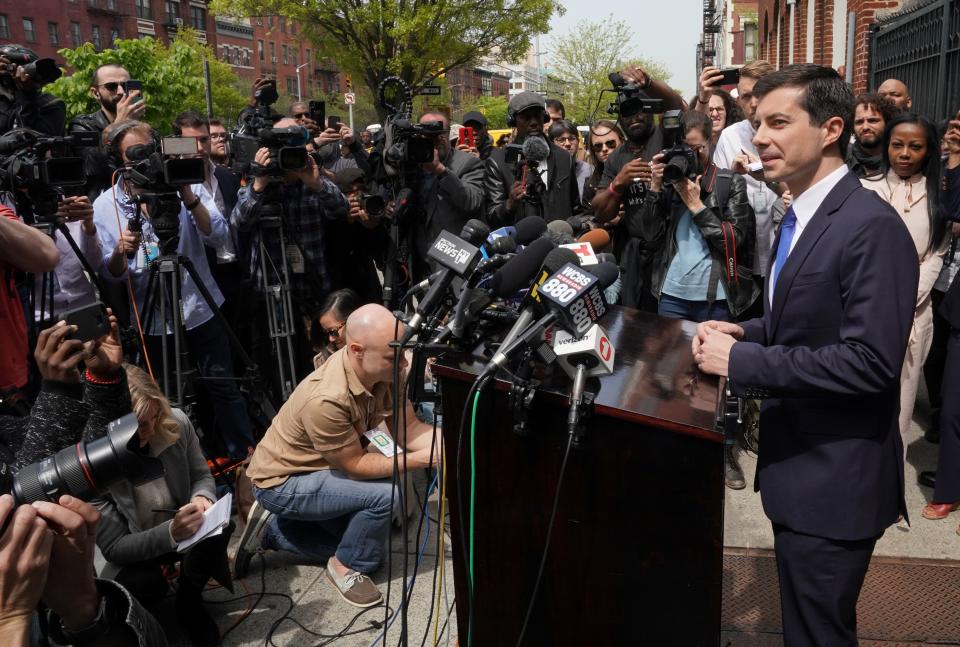In Harlem, Al Sharpton tells Pete Buttigieg to be himself

When Pete Buttigieg asked Rev. Al Sharpton for advice on campaigning for president in the South’s Bible Belt as an openly gay white man, the civil rights leader responded, “I think you should say, ‘I am who I am.’”
Buttigieg met Sharpton for lunch at the landmark Harlem soul food restaurant Sylvia’s on Monday to “discuss the need to confront homophobia in the faith community” as well as the South Bend mayor’s “policy agenda for the black community in Indiana and around the country,” according to a campaign statement.
“We need to deal with homophobia in the faith in the black community,” said Sharpton.
In the past month, Buttigieg has clashed with Vice President Mike Pence over his faith and sexuality; faced antigay protestors and hecklers outside of his home and on the campaign trail; and received criticism from evangelical leader Franklin Graham, who said the mayor’s homosexual lifestyle was “not something to be flaunted, praised or politicized.”
“You should be judged on your merits,” Sharpton told Buttigieg, who sat across from him at a table for two. “And we can’t fight against bigotry based on race and we’re going to be bigots based on sexual orientation.”
Sharpton suggested Buttigieg put the black LGBT community “on the table,” particularly when the mayor returns to campaign in South Carolina next month.
Buttigieg laid out his agenda for black voters, which he said “focuses on homeownership, entrepreneurship, health, education, and criminal justice.” But he also touched on issues that have given black voters pause. Buttigieg talked about his firing of South Bend’s first African-American police chief, a decision he said still “stings” with the black community. Later in front of reporters, Buttigieg reiterated his opposition to giving incarcerated felons the right to vote.
While “Mayor Pete” has risen to national prominence and has become a factor in the crowded Democratic presidential field, South Bend’s black residents have expressed lukewarm attitudes toward him and he still has a long way to go to win over black voters across the country. Perhaps in an attempt to make up that ground, Buttigieg has now met twice in one month with Sharpton, who called him “very much authentic” and “firm in who he was and what he represented.”

In early April, Buttigieg and other Democratic hopefuls spoke at Sharpton’s National Action Network annual conference. It was there that Buttigieg called for abolishing the death penalty and said he would sign a bill to commission a study on reparations for descendants of slaves.
Sitting across from Sharpton in Sylvia’s, as Sen. Kamala Harris, D-Calif., had done months before, Buttigieg candidly outlined his campaign strategy to reach diverse constituencies around the U.S, comparing it to “rock climbing.”
“I know I’ve got a handhold with the LGBT community [which] is a minority, but also touches every other part of the coalition,” he told Sharpton during lunch, which he apparently didn’t know was being broadcast live. “Or people in the Midwest — I’ve got a handhold there. So I can reach into the Latino community ... just take whatever relationships we have, then try to use those to reach other people.”
“The problem I have is some people will just come find me,” Buttigieg continued. “They’ll come to my rally, they’ll rush to my event, they’ll be at my fundraiser. But if I’m only talking out to the people who come to me, it’s not going to become more diverse.”
“So you’re going to reach out?” interjected Sharpton with a wide, sweeping arm gesture.
“I got to,” said Buttigieg.
“It’s important for this midwestern mayor to come to the mecca of black America, Harlem, to speak to our premier leader of black communities,” said Alvin Ponder, leader of NAN’s New York City chapter, who called Buttigieg’s appearance with Sharpton “good politics.” “The black vote is going to be extremely significant in the 2020 election. ...[H]e’s more in line with my views, which are between moderate and progressive.”
But while politically savvy New Yorkers recognized Buttigieg on Malcolm X Blvd. — and struggled to pronounce his name — others failed to see the cause for commotion.
Jerome, 31, from East New York, was having lunch at Sylvia’s when Sharpton and Buttigieg showed up trailed by men in suits and cameras. He recognized the reverend but couldn’t name the presidential candidate. Then again, he said he likely wouldn’t have recognized some of the other 18 2020 hopefuls anyhow.
“I kind of lost interest in politics,” he told Yahoo News. “When Hillary won the popular vote, but Trump ended up winning the election, it was kind of discouraging.”
Jerome, who nonetheless plans on voting in 2020, said Buttigieg’s race and sexual orientation didn’t matter to him but called it a “good thing” for Buttigieg to come to Harlem. “Hopefully, this is him having good intentions, being genuine and actually seeing what issues black folks care about,” said Jerome.

_____
Read more from Yahoo News:



